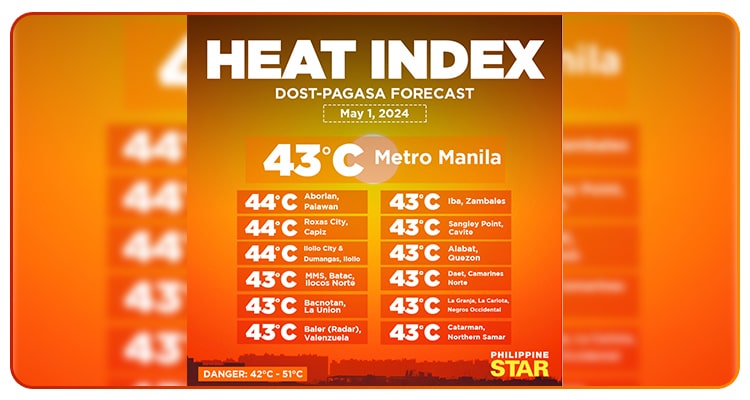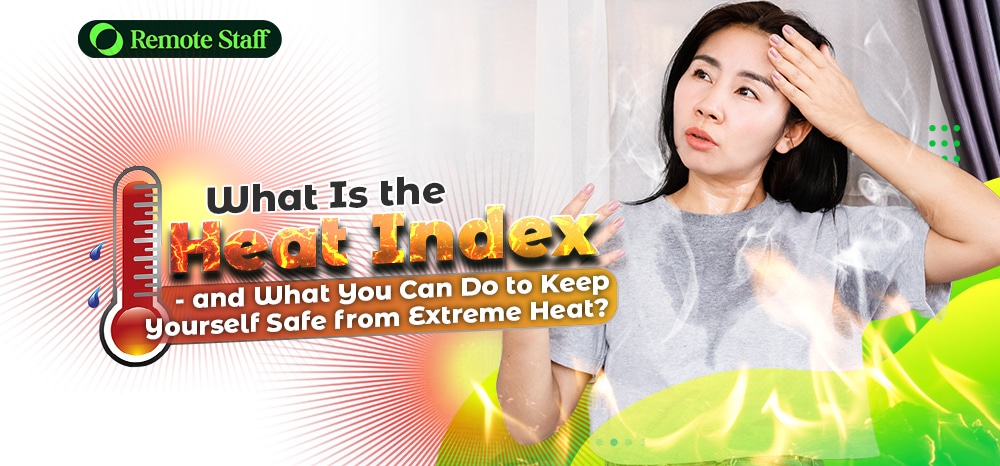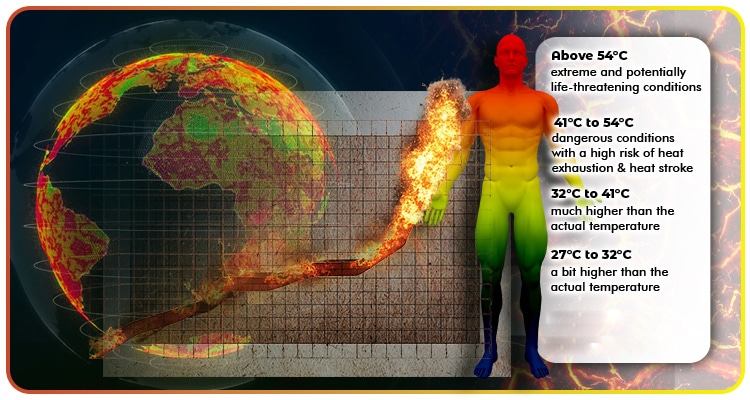Feeling the heat during these summer months?
As temperatures continue to rise this season, you should watch out for your health, even if you have an online job.
The summer heat can cause discomfort, exhaustion, and in extreme temperatures, pose serious health risks, especially if you’re living in the Philippines.

Source: Philippine Star
In fact, according to PAGASA, the heat index as of May 2 is approaching “dangerous” levels in 39 areas.
Many schools are closing for the season, and the heat wave is straining power grids, leading to power line explosions and widespread blackouts nationwide.
It’s certainly a significant challenge that demands attention.
However, amidst these concerns, what exactly does the heat index signify and what can you do to protect yourself from extreme weather?
What is the Heat Index?
The heat index, also known as the “feels-like” temperature, factors how humidity affects the body’s cooling process by sweating.
For instance, although the thermometer reads 38 degrees, the heat index could indicate that it feels more like 45 degrees if there’s high humidity.
For reference, here’s the range of heat index temperatures and how each one affects your body.
27°C to 32°C
In this range, the heat index might be a bit higher than the actual temperature, especially with moderate humidity.
You might feel a bit uncomfortable, but the risk of heat-related illnesses is relatively low if you take precautions.
32°C to 41°C
In this range, the heat index can be much higher than the actual temperature, especially in humid areas.
This makes heat-related illnesses like heat exhaustion more likely, especially with prolonged exposure or physical exertion.
41°C to 54°C
Heat indices in this range indicate dangerous conditions with a high risk of heat exhaustion and heat stroke.
It’s best to avoid outdoor activities during peak heat hours with this index.
Above 54°C
Heat indices above 54°C represent extreme and potentially life-threatening conditions.
This can quickly lead to heat stroke and other severe health problems, for instance.
During these extreme conditions, it’s better to stay in air-conditioned spaces and minimize outdoor exposure.
How Can You Protect Yourself and Your Family?
Given the current situation in the Philippines, the rising heat index is becoming a serious threat to public health.
Here’s what you can do to protect yourself and your family.
Stay Hydrated
Drink plenty of water to stay hydrated. Avoid beverages containing alcohol, caffeine, or large amounts of sugar, as they can dehydrate you.
Roughly 8-10 glasses of water a day is recommended.
Stay in Cool Places
Seek out air-conditioned or well-ventilated spaces, especially during peak heat hours.
If you don’t have access to air conditioning at home, you can stay in public places such as shopping malls, libraries, or community centers during the hottest parts of the day.
Use Cooling Devices
Use fans, cold compresses, or cool baths/showers to cool down as needed. Applying a cold, damp cloth to the skin periodically can also help relieve discomfort.
Dress Appropriately
Wear light, loose clothing made of breathable fabrics. Light colors can also reflect sunlight and heat.
Limit Outdoor Activities
If you can, avoid spending long periods outdoors during the hottest parts of the day, usually from late morning to early evening.
If you need to be outside, take breaks in shaded or cool areas and avoid strenuous activities.
Look Out for Signs of Heat Illness
The main health risks in this weather are heat exhaustion and heat stroke.
Heat exhaustion is a condition where the body overheats, leading to symptoms such as heavy sweating, rapid heartbeat, weakness, dizziness, and nausea.
If left untreated, it can develop into heat stroke, a serious condition where the body can’t control its temperature because it loses the ability to sweat, leading to a rapid rise in body heat.
This can harm the brain, heart, kidneys, and other organs. So if you or someone else experiences the symptoms above, seek medical attention immediately.
With these tips, you can keep yourself and your family safe from the intense heat, even if you’re working from home.
However, if you’re still looking for home-based jobs in the Philippines, you can sign up with Remote Staff for the best remote working opportunities for Filipinos
Remote Staff can connect you with long-term clients, enabling you to work from home permanently, sparing you from having to commute every day amidst the increasingly intense Philippine summer.
Register today!



